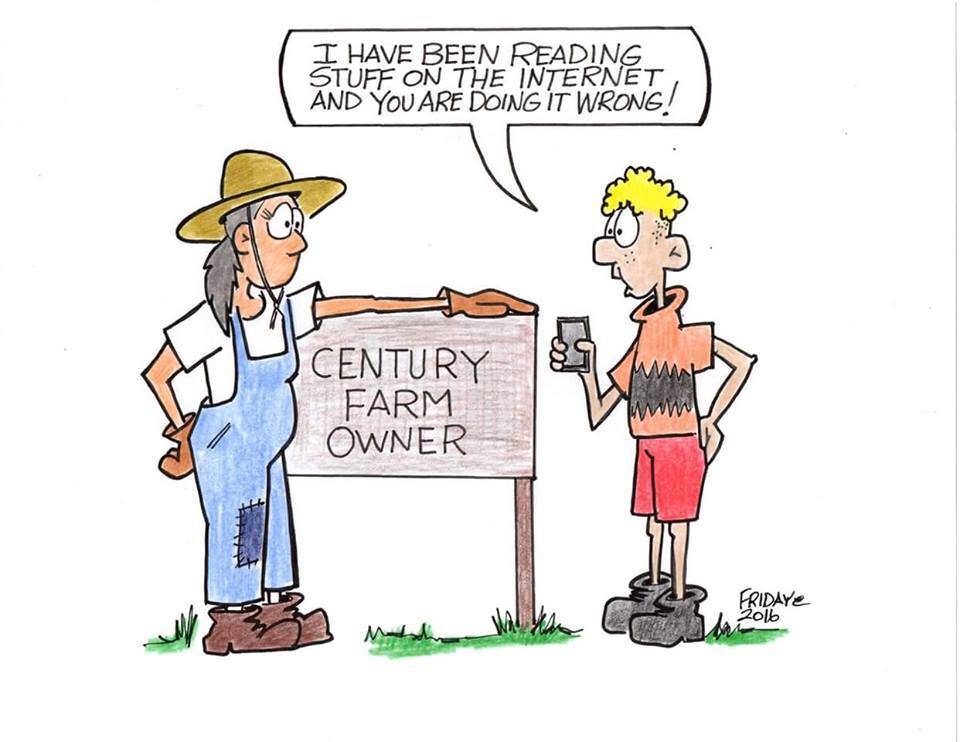“I’m just an old pig farmer!”
When people ask about what I do, or whenever I’m starting a speech, this is how I describe myself. I do call myself an old pig farmer, but then go on to explain just what that entails! My wife, Janice, and many other people get upset about this description because they think it sounds derogatory. Yet, as a farmer, this is a natural response! Most farmers are humble, down-to-earth people. We don’t like to brag.
Last week on my Facebook page I shared this cartoon, which depicts a female Century Farm owner who is being told by a young man who is telling her that she doesn’t farm right. A lot of learning can be done through books – and some information on the Internet is true. However, nothing (in my opinion) replaces experience. I’ve written before about how farming practices vary farm by farm, based on soil type, typography, climate, etc.
While I believe this cartoon makes a valid point, some folks in my newsfeed took offense that the farmer was dressed in bib overalls with a patched knee or a white t-shirt. This perception of a farmer is all too common, but it doesn’t portray how a modern farmer dresses. Admittedly, there are time when I wear bibs on the farm because they’re handy. However, I dress up when I go to town or give a presentation to a group about pig farming.
Just like my city cousins:
- I have kids and grandkids.
- I’m interested in our school systems.
- I’m concerned about how our government works – and doesn’t work!
- I go to church and serve as a church elder.
- I participate in local organizations such as the Chamber of Commerce.
- I worry about health services, including mental health. How can we make them better?
- I’m very concerned about our small towns and how to make them better.
 What’s more shocking than community involvement is the reaction I get from people once they see the vast knowledge and experience most farmers have! Farmers must know:
What’s more shocking than community involvement is the reaction I get from people once they see the vast knowledge and experience most farmers have! Farmers must know:
- Computers. Technology continues to define agriculture. I deal with computers every day – and not only like the one I’m typing on now! Computers run almost everything on a farm from heating and cooling in livestock barns to GPS units, machinery and equipment. Farms are like any business in town or even your home as computers have become necessary.
- Medicine. Animals get sick just like you or your kids, do we must take care of our animals!
- Animals. We need to understand how animals act or react. Animals have a natural pecking order. We design barns to fit their instincts. If we can use their natural instincts, we can do a better job taking care of them.
- Carpentry and mechanics. Farmers are always looking ways to improve their operations and often innovate to make things better. Using tools is practically a part of our genes.
- Genetics. Just as humans today are taller and stronger than in the past, crops and livestock have evolved. Today’s crops have been bred to stand up to weather changes, fight pests and, of course, yield more. Our farms are more “sustainable” because of our knowledge of genetics!
- Mechanics. There is always something to be fixed on a farm: tractors and all the implements they pull such as combines, semis, wagons, sprayers. There is an endless list of things that farmers must take care of and maintain.
One last thing that has become “a must” for farmers to do is to defend themselves! So many people are confusing facts with fiction. Activists have done such a great job of spreading fear that people are spending money unnecessarily to purchase bottled water with the “non-GMO label!” Not only that, but there appears to be a ground swell of people calling for organic crops and conventional tillage. Crazy! GMO crops actually enable farmers to till less often, leading to improved soil health and water retention, reduced runoff, and reduced greenhouse gas emissions.
Recently I read another Huff Post article entitled, “GMO Propaganda has no place in your child’s classroom.” Imagine this… that editorial was written by an activist. You can bet I’ll address this topic in my next blog!
Interestingly enough, a new poll by Huffington Post shows support for GMOs raises with education level. Forty-nine percent of respondents with a college degree said they believe GMOs are generally safe, as compared with 36 percent who had completed some college and just 22 percent who completed high school or less. The poll also showed that respondents who trust scientists tend to believe GMO foods are safe. Forty-eight percent of respondents who trust scientists “a lot” think GMOs are safe, compared with 28 percent of those who trust scientists “a little” or not at all.
Yes, more “education” is needed to help those who live and work in the city understand what’s happening in the country. I’ll do my part to help tell my story. Will you?
